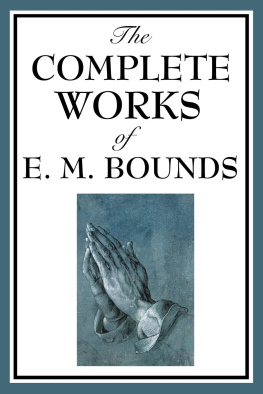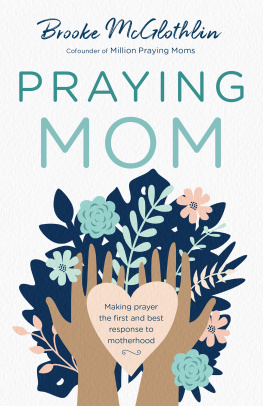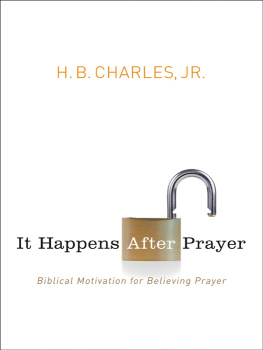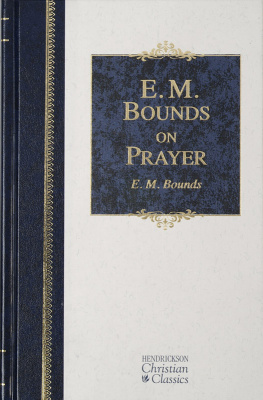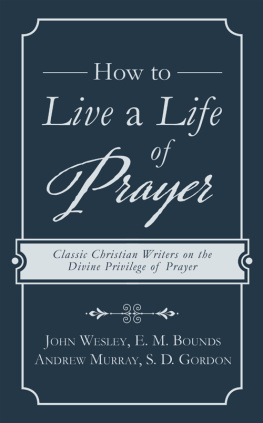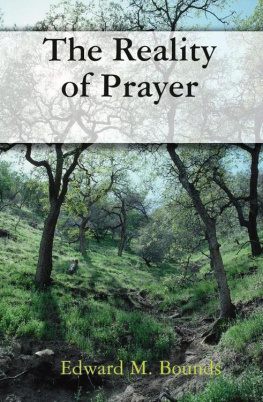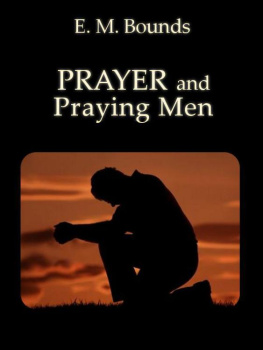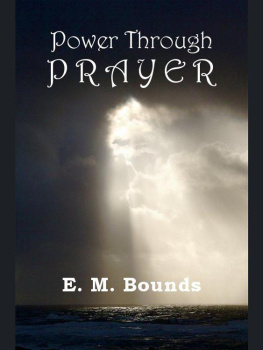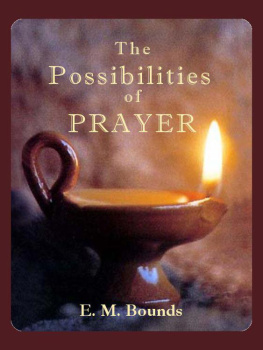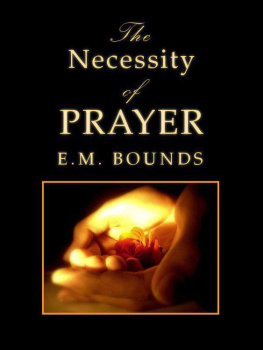Power Through Prayer
The Complete Works of E. M. Bounds
By E. M. Bounds
Power Through Prayer
Prayer and Praying Men
The Essentials of Prayer
The Necessity of Prayer
The Possibilities of Prayer
The Reality of Prayer
Purpose in Prayer
The Weapon of Prayer
Start Publishing LLC
Copyright 2012 by Start Publishing LLC
All rights reserved, including the right to reproduce this book or portions thereof in any form whatsoever.
First Start Publishing eBook edition October 2012
Start Publishing is a registered trademark of Start Publishing LLC
Manufactured in the United States of America
10 9 8 7 6 5 4 3 2 1
ISBN
Introduction
Power through Prayer has been called one of the truly great masterpieces on the theme of prayer. The term classic can appropriately be applied to this outstanding book.
In twenty provocative and inspiring chapters, each prefaced with quotations from spiritual giants, Edward M. Bounds stresses the imperative of vital prayer in the life of a pastor. He says,... every preacher who does not make prayer a mighty factor in his own life and ministry is weak as a factor in Gods work and is powerless to project Gods cause in this world.
Recreation to a minister must be as whetting is with the mower--that is, to be used only so far as is necessary for his work. May a physician in plague-time take any more relaxation or recreation than is necessary for his life, when so many are expecting his help in a case of life and death? Will you stand by and see sinners gasping under the pangs of death, and say: God doth not require me to make myself a drudge to save them? Is this the voice of ministerial or Christian compassion or rather of sensual laziness and diabolical cruelty.Richard Baxter
Misemployment of time is injurious to the mind. In illness I have looked back with self-reproach on days spent in my study; I was wading through history and poetry and monthly journals, but I was in my study! Another mans trifling is notorious to all observers, but what am I doing? Nothing, perhaps, that has reference to the spiritual good of my congregation. Be much in retirement and prayer. Study the honor and glory of your Master.Richard Cecil
The Letter Killeth
During this affliction I was brought to examine my life in relation to eternity closer than I had done when in the enjoyment of health. In this examination relative to the discharge of my duties toward my fellow creatures as a man, a Christian minister, and an officer of the Church, I stood approved by my own conscience; but in relation to my Redeemer and Saviour the result was different. My returns of gratitude and loving obedience bear no proportion to my obligations for redeeming, preserving, and supporting me through the vicissitudes of life from infancy to old age. The coldness of my love to Him who first loved me and has done so much for me overwhelmed and confused me; and to complete my unworthy character, I had not only neglected to improve the grace given to the extent of my duty and privilege, but for want of improvement had, while abounding in perplexing care and labor, declined from first zeal and love. I was confounded, humbled myself, implored mercy, and renewed my covenant to strive and devote myself unreservedly to the Lord.Bishop McKendree
The preaching that kills may be, and often is, orthodoxdogmatically, inviolably orthodox. We love orthodoxy. It is good. It is the best. It is the clean, clear-cut teaching of Gods Word, the trophies won by truth in its conflict with error, the levees which faith has raised against the desolating floods of honest or reckless misbelief or unbelief; but orthodoxy, clear and hard as crystal, suspicious and militant, may be but the letter well-shaped, well-named, and well-learned, the letter which kills. Nothing is so dead as a dead orthodoxy, too dead to speculate, too dead to think, to study, or to pray.
The preaching that kills may have insight and grasp of principles, may be scholarly and critical in taste, may have every minutia of the derivation and grammar of the letter, may be able to trim the letter into its perfect pattern, and illume it as Plato and Cicero may be illumined, may study it as a lawyer studies his text-books to form his brief or to defend his case, and yet be like a frost, a killing frost. Letter-preaching may be eloquent, enameled with poetry and rhetoric, sprinkled with prayer spiced with sensation, illumined by genius and yet these be but the massive or chaste, costly mountings, the rare and beautiful flowers which coffin the corpse. The preaching which kills may be without scholarship, unmarked by any freshness of thought or feeling, clothed in tasteless generalities or vapid specialties, with style irregular, slovenly, savoring neither of closet nor of study, graced neither by thought, expression, or prayer. Under such preaching how wide and utter the desolation! how profound the spiritual death!
This letter-preaching deals with the surface and shadow of things, and not the things themselves. It does not penetrate the inner part. It has no deep insight into, no strong grasp of, the hidden life of Gods Word. It is true to the outside, but the outside is the hull which must be broken and penetrated for the kernel. The letter may be dressed so as to attract and be fashionable, but the attraction is not toward God nor is the fashion for heaven. The failure is in the preacher. God has not made him. He has never been in the hands of God like clay in the hands of the potter. He has been busy about the sermon, its thought and finish, its drawing and impressive forces; but the deep things of God have never been sought, studied, fathomed, experienced by him. He has never stood before the throne high and lifted up, never heard the seraphim song, never seen the vision nor felt the rush of that awful holiness, and cried out in utter abandon and despair under the sense of weakness and guilt, and had his life renewed, his heart touched, purged, inflamed by the live coal from Gods altar. His ministry may draw people to him, to the Church, to the form and ceremony; but no true drawings to God, no sweet, holy, divine communion induced. The Church has been frescoed but not edified, pleased but not sanctified. Life is suppressed; a chill is on the summer air; the soil is baked. The city of our God becomes the city of the dead; the Church a graveyard, not an embattled army. Praise and prayer are stifled; worship is dead. The preacher and the preaching have helped sin, not holiness; peopled hell, not heaven.
Preaching which kills is prayerless preaching. Without prayer the preacher creates death, and not life. The preacher who is feeble in prayer is feeble in life-giving forces. The preacher who has retired prayer as a conspicuous and largely prevailing element in his own character has shorn his preaching of its distinctive life-giving power. Professional praying there is and will be, but professional praying helps the preaching to its deadly work. Professional praying chills and kills both preaching and praying. Much of the lax devotion and lazy, irreverent attitudes in congregational praying are attributable to professional praying in the pulpit. Long, discursive, dry, and inane are the prayers in many pulpits. Without unction or heart, they fall like a killing frost on all the graces of worship. Death-dealing prayers they are. Every vestige of devotion has perished under their breath. The deader they are the longer they grow. A plea for short praying, live praying, real heart praying, praying by the Holy Spiritdirect, specific, ardent, simple, unctuous in the pulpitis in order. A school to teach preachers how to pray, as God counts praying, would be more beneficial to true piety, true worship, and true preaching than all theological schools.

